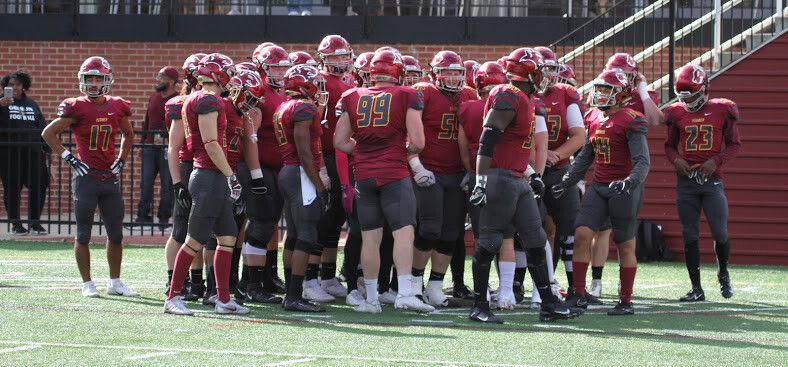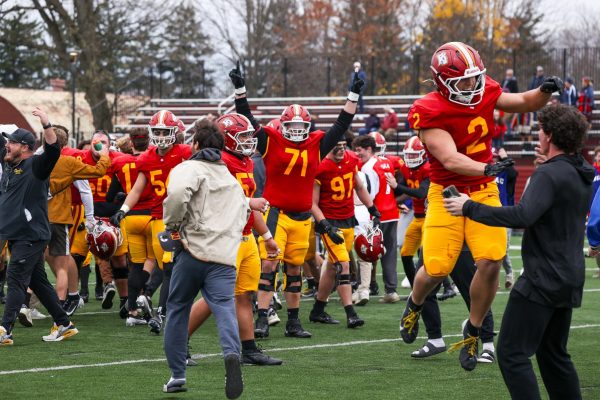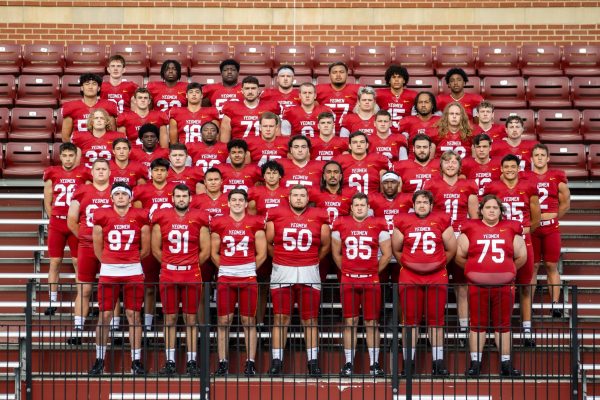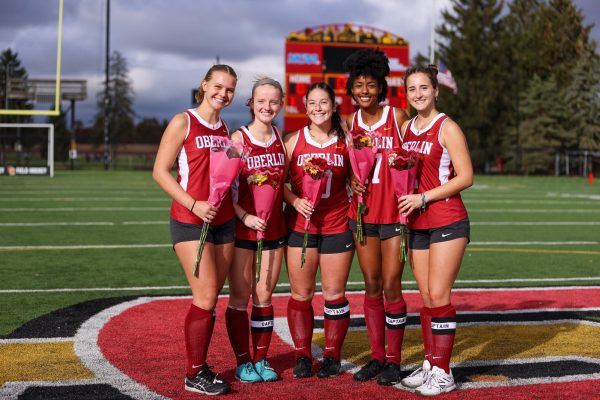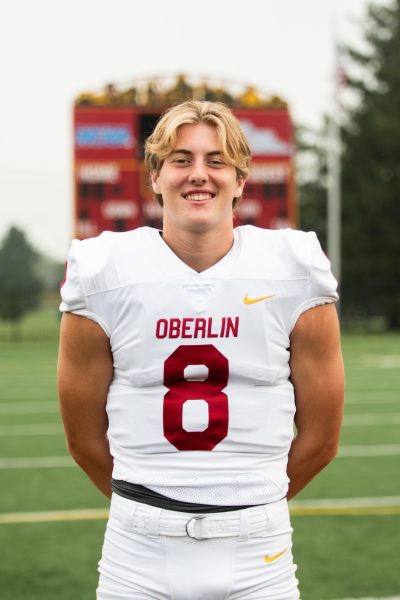Current and Former Football Players Express Concern About Team Culture
Photo courtesy of OC Athletics
The Oberlin College varsity football team.
Founded in 1891, Oberlin’s football team has provided a community to both athletes and spectators, alike, for generations. Despite this history, the team has seen significant turnover over the past few years; this past season alone, seven players left the team. This upcoming season, the team will have seven rising fourth-years on a 29-person roster. In previous seasons, this number was higher; in 2017, the roster included 16 fourth-years.
At the end of the past season, Head Football Coach Jay Anderson announced that he was stepping down from his position at Oberlin to become the defensive coordinator and assistant head coach at Notre Dame College in South Euclid, Ohio.
Steve Opgenorth was named head football coach to replace Anderson. He spent the last five seasons at Baldwin Wallace University serving as associate head coach, offensive coordinator, and quarterbacks’ coach. This announcement serves as an opportunity to implement changes in the program as a whole — especially as several former players have expressed concerns about coach and staff conduct.
While the team has made strides to promote an inclusive and productive environment, there is still much room for improvement, particularly when it comes to supporting injured players, as highlighted by former-football player and College third-year Ben Collado.
Last season, Collado ultimately decided to leave the team and, consequently, move away from a sport he’d spent his entire life playing, after receiving two concussions and fracturing his neck during play. He was disappointed with the management style of the team staff, whom he felt, at times, prioritized his playing time over his safety.
“The baseline test measures how your brain works cognitively, including reaction time,” he said. “So, when you think you have a concussion, you have to retake the test and see if there’s a delay in or an issue with your memory. But I never took that test, so, after I got my first concussion, it was harder to track my progress and see if I was getting better and even diagnose the concussion in the first place.”
Director of Sports Medicine Jill Rondini could not comment on the specific athlete’s medical care due to the Health Insurance Portability and Accountability Act, or HIPAA, but shared that concussion protocol varies across teams.
“Athletes who participate in contact varsity sports undergo baseline concussion testing which may be administered differently for various reasons,” Rondini wrote in an email to the Review.
Delta Lodge Director of Athletics and Physical Education Natalie Winkelfoos added that, while baseline testing is helpful in assessing the impacts of a concussion, Oberlin does not require it of all varsity athletes.
“Baseline testing is not required,” she wrote in an email to the Review. “Baseline testing is a tool that can be used to assist our care team’s work but it is not critical to concussion management.”
College fourth-year and running back Melvin Briggs, who was on the football roster all four seasons of his Oberlin career, agreed on the need for further medical support from the program. In particular, Briggs was dissatisfied with the length of time it took trainers to communicate his injury to medical staff and the College.
“None of my professors had any documentation of my concussion for four weeks,” he said. “I never really had the chance to recover. Within a matter of months, I was diagnosed with severe depression and chronic anxiety.”
In response to this allegation, Winkelfoos had the following to say.
“I cannot discuss a student-athlete’s medical care,” she wrote. “This is a very specific circumstance in which all information has perhaps not been provided to you. We make every effort to ensure the concussion protocol is followed. Everyone needs to do their part for it to be successful … our sports medicine staff, disability services and the student-athlete.”
In addition to physical support, Collado hopes that in the future coaches will be more equipped to handle conversations surrounding mental health.
“It needs to be a conscientious effort across the board,” he said. “From an administrative level, and coaches holding each other accountable when issues come up. Coaches need to be equipped to handle situations relating to mental health issues, so they will know what is appropriate to say.”
Collado also stated that coaches did not always reflect the principles of Oberlin, perpetuating a culture that he felt was toxic.
“There was rarely a meeting without a homophobic comment or something of that nature,” he said. “I feel like the coaches weren’t always on board with what the College is trying to do from a cultural standpoint.”
Winkelfoos said she had no knowledge of homophobic comments made by coaching staff.
“I am not and have not been made aware of homophobic comments made by members of our coaching staff,” Winkelfoos wrote in an email to the Review. “The expectation is that, as employees, our behavior and actions reflect the values of Oberlin College. Diversity broadens perspectives — enhances educational and social experiences. If there is a reluctance to understand and appreciate this, the opportunity to serve this institution and its students may not exist.”
College second-year Raul Segredo said he decided to quit the team because of the coaching staff, who he felt did not listen to his concerns both on and off the field. After he quit the team, his locker was defaced and he believes that a coach was involved in the incident.
“The few, rare, good [coaches] never stick around, and the rest are bullies who like to hear themselves speak,” he said. “Coaches would often say their door was always open to speak, but when I did reach out to try to explain my problems they would hardly ever hear me out. Mostly they just pretended to care and made empty promises I knew they wouldn’t keep. After I quit, someone defaced my locker as well. They wrote slur words and mocked me. I’m not sure exactly who did it, but I’ve spoken to a lot of people on the team and there is consensus that a coach was involved.”
Winkelfoos rejected the allegation that a coach was involved in defacing the locker, and Anderson did not directly respond.
While Segredo was disappointed with the coaching staff, he was grateful for his teammates during his time on the team.
“I loved all of my teammates and they pushed me to work hard in all aspects of my life; something I miss greatly,” he said. “I didn’t particularly like any of the coaches and I think part of the reason why is because there were new ones every year; it’s hard to get attached when you don’t know exactly who’s sticking around.”
Briggs is still optimistic about the program’s direction, citing leadership from his fellow teammates as crucial during this transition.
“I think that this team is going to be doing well starting next year,” Briggs said. “They have a lot of people this year who took the circumstances that they were in and made the best of it, especially in terms of leadership from the [younger students] all the way up to the coming fourth-years.”
All former athletes interviewed agreed that the dynamic between players did not contribute to their decision to leave the team, nor was it an easy decision for the players who left to quit the team.
“What I love about a football team is it doesn’t matter what color you are, who you pray to, or how you live your life,” said Segredo. “You’re all there because you share the love for the game.”
It is crucial that the College reinforces its mission of inclusivity not only to student-athletes, but also to football coaches and training staff with whom players spend countless hours. It is the responsibility of coaches and staff not only to support students on the playing field, but also to create a safe space that supports the needs of all players. This period of leadership transition is a chance to address the flaws in the program, and will shape the football experience of future athletes.
The Review reached out to several former and current players on the team for this story in addition to the ones quoted above. Five current players did not respond for comment and three declined. Three former players also declined to comment.


